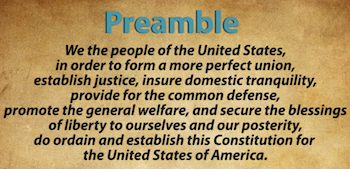| A | B |
|---|
| Federal System | divide powers between the states and the national government |
| Concurrent Powers | taxing, borrowing money, and enforcing laws |
| Why 3 Branches of Gov't | keep any one branch from growing too powerful |
| U.S. Census | determines how many members represent each state in the House of Representatives |
| function of Congress | Congress is the legislative branch, which makes the nation’s laws |
| vice president’s role | As president of the Senate, he casts a vote only in case of a tie |
| Why is it difficult for Congress to override a veto? | They would need to have a two-thirds majority vote. |
| vetoing a law | president can check the power of the legislative branch by |
| executive order is | presidential command that has the power of law |
| When the House of Representatives impeaches a president they | vote to bring charges of serious crimes against him |
| The role of the Judicial Branch | Interprets the laws |
| What do Thurgood Marshall and Sandra Day O’Connor have in common? | They were the first justices to represent Africans Americans and women, respectively, on the Supreme Court. |
| James Madison | drafted the list of proposed constitutional amendments that became the Bill of Rights |
| the idea of majority rule, whose decisions make policy for everyone? | the greatest number of people in a society |
| petition | To show government their dissatisfaction with a law or suggest new laws, the American people have a right to |
| The First Amendment protects | freedom of religion, expression, and assembly |
| “double jeopardy” means | individuals cannot be tried a second time for a criminal offense if a jury has found them not guilty |
| eminent domain | The one exception to the Fifth Amendment rule that no person can have property taken from them without due process of law is called |
| The Eighth Amendment protection against “cruel and unusual punishments” has sparked debate over what issue? | capital punishment |
| A grand jury’s decision that there is enough evidence to formally accuse a person of a serious crime is called | indictment. |
| Cases in which a harm has been done but no crime has been committed are decided | in civil court. |
| The function of the Ninth and Tenth Amendments is to | protect rights not addressed by the first eight amendments. |
| What is required for a person to become a naturalized citizen? | They must move to the United States permanently and apply for citizenship |
| Why do American men 18 years old or older have to register with selective service? | so the federal government can contact them in case of a draft |
| Which of these duties of a citizen is encouraged, but not required? | voting in elections |
| separation of powers | divides government so that no one branch of government can become too powerful. |
| judicial | branch determines whether or not laws are constitutional |
| political action committees | collect money for candidates who support certain issues. |
| 4th Amendment | Unreasonable Search and Seizure |
| due process | What constitutional protection places limitations on laws and legal proceedings in an effort to guarantee fairness and justice? |
| Why was the Bill of Rights added to the Constitution? | people were afraid that a strong central government might take away the rights that states had granted to individuals. |
| 7th Amendment | a jury can decide Civil Cases. |
| 6th Amendment | your right to have a Lawyer |
The Preamble,  | Main Idea? What do the different parts mean? Why those parts? |